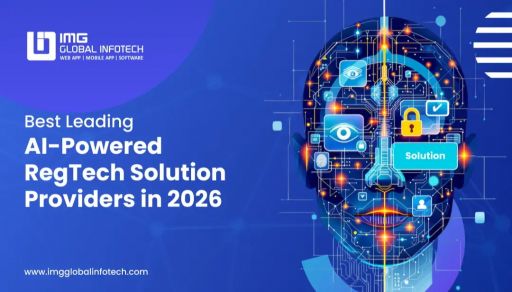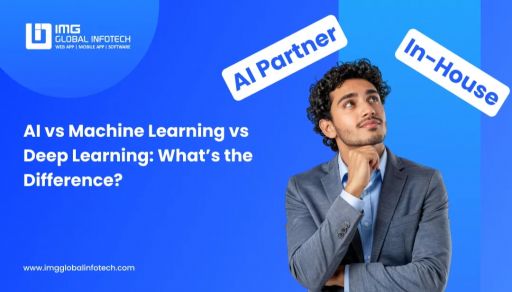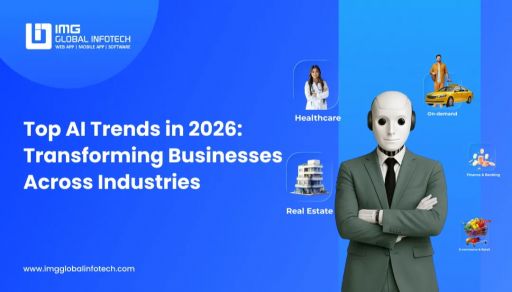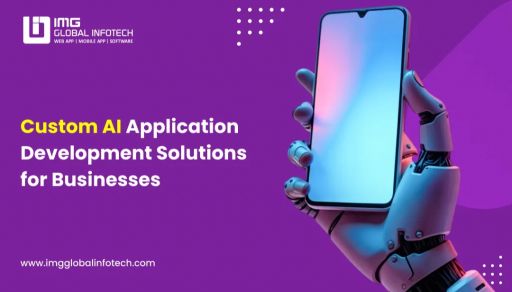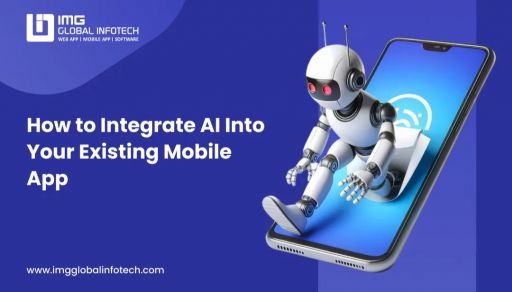How AI Is Transforming Healthcare: Benefits, Challenges & The Future Of Medicine
Dipti Singhal
Jun 16, 2025

Artificial intelligence is shaking up health care, changing diagnosis, treatment plans, bedside care, and even research in dramatic ways. Because it can sift through mountains of data, spot unseen patterns, and forecast outcomes with surprising accuracy, AI is lending a hand to clinicians in tasks that once seemed the province of only the human brain. As this technology pushes forward, a thorny question keeps coming up: Will machines one day take the place of doctors? Although software already boosts efficiency and sharpens precision, the notion of completely crowding out professional skill still stirs debate and doubt. In this post, we weigh where AI stands today, what it does well, and where it stumbles, then ask honestly whether it for the sake of patients even ought to fill doctors' shoes down the road. Together, let's wander through the bright potentials and hard limits of this digital shift in medicine
AI in Healthcare: What It Is and How It’s Transforming the Industry
When people talk about AI in healthcare, they mean smart algorithms and machine-learning models that dive into messy medical files, automate everyday chores, and lend a hand at the bedside.
By echoing a slice of human thought, these systems read charts, scan vital signs, and crunch histories in seconds, letting providers spot flags, forecast risks, and tailor therapy for each person. Probably the loudest success story lives in medical imaging: here, clever models hunt for hidden tumors, tiny fractures, or even subtle signs of disease with a consistency and speed that often leaves the human eye behind.
AI chatbots and virtual assistants are also enhancing patient engagement through 24/7 support, Doctor Appointment App management, and symptom-checking capabilities. AI predictive analytics is helping healthcare providers detect potential outbreaks and chronic disease risks sooner than ever.
Again, AI is not here to replace healthcare workers. It is here to enhance the capabilities of the people providing care. It diminishes the chance for human error, improves speed, and improves access to care, particularly in underserved areas. AI is now embedded in the way the healthcare industry operates, from robotic-assisted surgeries and AI-based drug discovery to other areas fit for AI action. As the shift to this new tech continues to grow, AI will continue to evolve how we form a more efficient, accurate, and patient-centered care style healthcare system.
How AI Is Currently Being Used In Healthcare?
Artificial Intelligence is quickly becoming a game-changer for healthcare, providing new ways to enhance patient care, streamline operations and move the field forward. Here are five examples of how AI is being used in healthcare today:
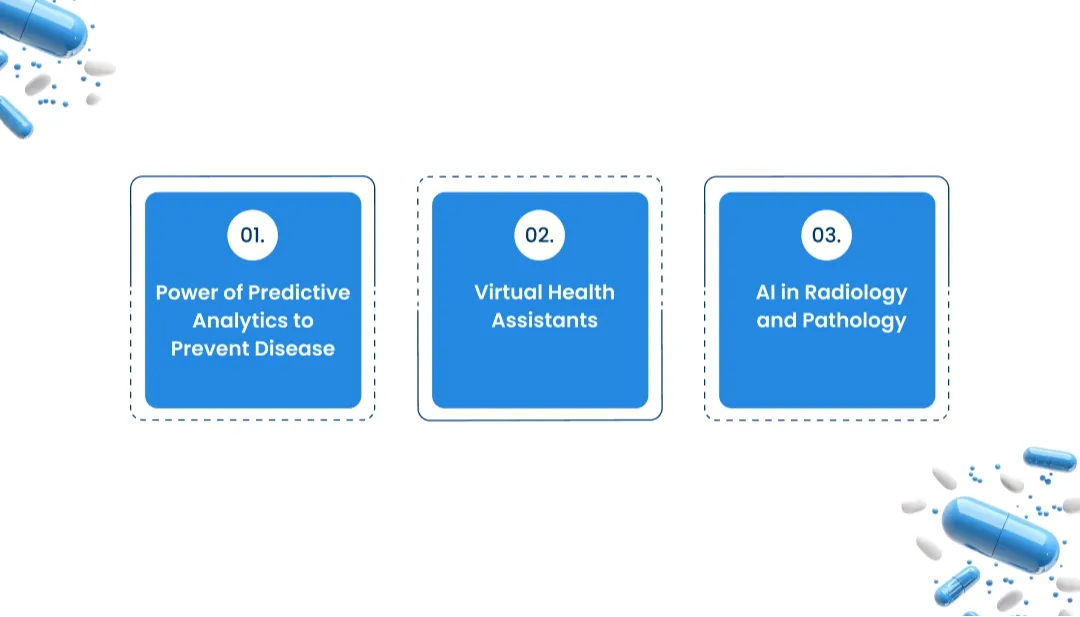
Power of Predictive Analytics to Prevent Disease
AI applications analyze data including patient background, insurance data, spending, lifestyle, etc., and potentially with genetic information, predict the likelihood of chronic disease including diabetes, heart disease, and even cancer. The hospitals and clinics will be able to use data and information predicting either likelihood or current patients predisposition to providing preventive care prior to symptoms.
Virtual Health Assistants
Industry-specific AI-driven, virtual health assistants, are being embedded into mobile health or hospital systems to respond to patient questions, send medication reminders, and help patients manage chronic conditions. The virtual assistants help to alleviate some of the workload on healthcare resources while empowering patients with their treatment.
AI in Radiology and Pathology
AI applications are assisting radiologists and pathologists in distinguishing a scan and tissue sample to expedite the detection of abnormalities. AI can also be incorporated to highlight tumors detected on an MRI, or analyze biopsy slides, potentially acting as a second set of eyes and minimizing diagnostic error.
Also Read - Telemedicine App Development Cost
Key Uses Of AI In Medicine

1. Medical Imaging Analysis
AI processes medical imaging and examines the same x-ray, MRI, and CT score as a radiologist; and it has higher accuracy in identifying tumors, fractures, and diseases at approx. 45% less time, which can help reduce diagnostic errors by quickly detecting abnormalities, and allowing for earlier health intervention.
2. Drug Discovery and Development
AI can expedite drug discovery by exploring candidate molecular structures and predicting the behavior of compounds, while interpreting simulated targeted clinical intervention outcomes. The more time and cost reductions AI can achieve, the faster industry can produce new, effective, medications.
3. Personalized Medicine
AI can develop treatment plans for patients using individual genetic profiles, medical history, and lifestyle. Predicting how a person may respond to specific therapies or drugs while examining whether it creates the greater benefit.
4. Virtual Health Assistants
AI chatbots and voice assistants can help patients manage medications, book appointments, check common symptoms, and answer general health questions. They also help share the healthcare workload, while also improving access to care.
5. Predictive Analytics for Disease Prevention
AI evaluates patient information to determine risk factors for chronic conditions such as diabetes and cardiovascular conditions and can suggest preventive action and early interventions that could save lives and healthcare costs.
6. Robotic Surgery
AI-enabled robotic assistants in surgical procedures that require particular precision and imposing minimally-invasive techniques can also allow skilled surgeons to maintain control under surgical conditions and with surgery overall. AI-enabled robotic surgery approaches may minimize complication rates, promote recovery time, and improve outcomes.
7. Clinical Decision Support Systems (CDSS)
AI-based tools can rely on patient records and lab studies and research to provide real-time clinical recommendations. By analyzing vast amounts of data, AI-based tools can help physicians document evidence-based decisions at the point of care.
8. Automated Hospital Workflows
AI technologies can usher automation in daily administrative procedures (i.e. patient triage, administrative actions, scheduling, etc.). These administrative activities will improve service performance, decrease error-prone procedures, and allow employees time to focus on patient-centric actions.
9. Remote Patient Monitoring
Wearable monitoring devices use AI-enabled to help professionals, such as nurses, remotely facilitate health metrics, including body temperature, heart pace, blood pressure, and mood. These monitoring devices can alert staff to suspected abnormalities, so patients can receive proactive care to decrease their likelihood of needing hospital admissions.
10. Mental Health Support
AI can utilize care tools such as chatbots or emotion-recognition devices to provide mental health support 24/7, even for higher acuity cases where a patient could begin to speak or feel a shift in their mental and emotional health during check-ins or emotional evaluation times with them. AI provides sensitive management to those in need of coping mechanisms as the first line of support, especially for lower risk and underserved clients.
Related Post - Hire Healthcare App Developers To Transform Healthcare Apps
Can AI Replace Doctors?
The surge in Artificial Intelligence (AI) in healthcare has initiated a worldwide discussion: can machines replace human doctors? The benefits that AI brings are no doubt powerful, but the question has more layers. Let’s summarize three reasons for AI vs doctors.
1. No human empathy or judgment
If AI replaces doctors, it can provide data analysis, pattern identification, and recommendations, but it cannot provide human empathy, instinct, or ethical judgement. The delivery of medical care is often preceded by emotional support, conversations that depend on human connection, and consideration of a patient’s mental and social context.
2. AI is Support, not Substitute
Impact of AI on doctors provides the most benefit for tasks such as diagnostics, image evaluation, or data processing, and is more likely to be successfully integrated as an assistant for professionals. However, if any ambiguous situations arise or unforeseen complications occur during care or surgery, AI doesn’t have the capability to synthesise that information and provide a final decision.
3. AI relies on quality data and oversight
Machine learning in healthcare operates from quality, ideally unbiased data. If input data is incorrect, there is no human oversight, or AI makes a biased assumption through machine learning, the results can be inaccurate. Doctors are tasked with vetting AI conclusions, and ensuring application is built within each unique patient context.
Benefits Of Using AI in Healthcare
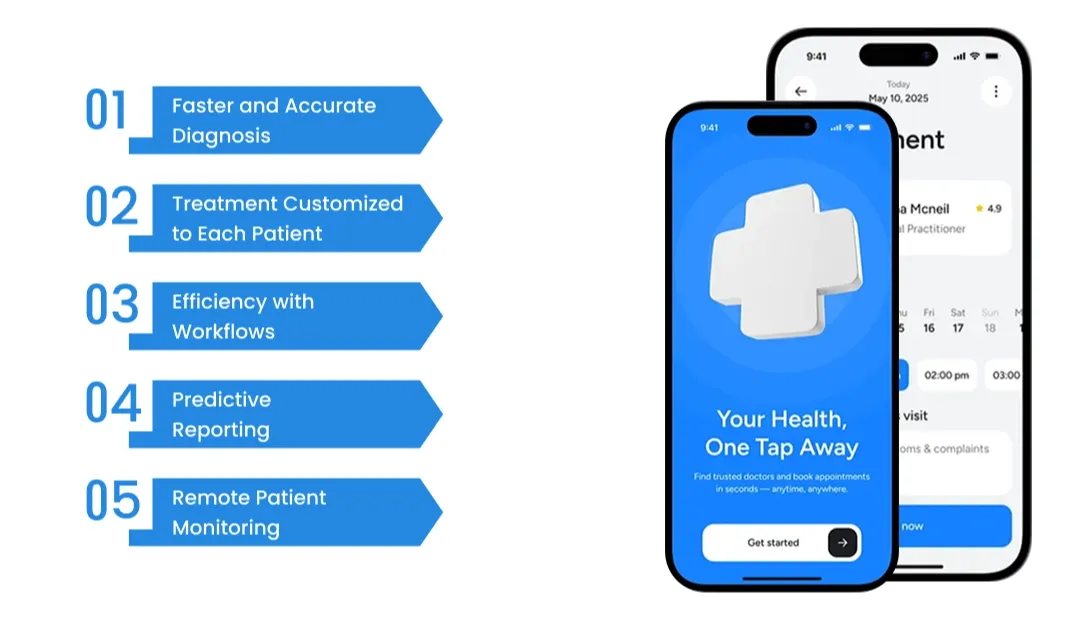
1. Faster and Accurate Diagnosis
AI can efficiently examine medical data including scans and test results and to identify diseases quickly and accurately. In some circumstances, the earlier a sickness is detected, the better the prognosis for the patient follows treatment.
2. Treatment Customized to Each Patient
AI can digest the patient's history, genetic code, and lifestyle and deliver a properly customized treatment plan. This can also help improve the effectiveness of multiple therapies while decreasing side effects in a particular patient for a specific treatment pathway.
3. Efficiency with Workflows
AI can handle several of the administrative aspects of practice including documentation, billing, scheduling and keep the physicians and other employees focused on patient care and communication. By eliminating human-based errors through automation of processes can also create a less stressful workflow for each practitioner.
4. Predictive Reporting
AI in hospitals can also analyze patterns and cohorts in patient data and deliver educational prompts to predict outcomes, nature, or possibility of occurring future illnesses to allow for preventive care as part of their treatment pathway. AI in healthcare app development may also decrease the health-care utilization through Hospital Management Software Development readmissions along with their associated costs of being treated for concurrent illnesses by grouping them as a billable, decreasing the time resources associated with attending a lot of appointments, performing unnecessary diagnostic procedures such as ordering unnecessary lab tests.
5. Remote Patient Monitoring
Healthcare AI solutions utilize devices that measure blood pressure, heart rate, oxygen levels, and many biometrics very easily and continue to work in real time with providers personally to then intervene or identify. AI healthcare technologies are the next step for each patient in real time, along with any monitoring in daily life as a daytime activity or nurse visit the day it was recorded as a hospital admission.
Related Blog - Artificial Intelligence In Pharmacy
The Future of AI in HealthCare: Humans as Leads, Machines as Support
The future of AI in healthcare is in a collaborative model where human intelligence and artificial intelligence (AI) work together to more effectively provide better, quicker, and equal access to health care. Human intelligence is at the centre of decision-making, ethics, and human empathy, while AI continues to achieve revolutionary improvement in many areas of health care. The following 7 ways AI in healthcare app development will influence the future:
Augmented Diagnosis
AI can review a medical imaging case, laboratory results, and patient history in seconds and allow the practitioner (human) to improve their diagnostic accuracy and lead time. However, human doctors and other doctors will always interpret the medical image, lab results, and patient history in the context of emotional, social, and lifestyle factors, which Human vs machine in healthcare is not yet able to replace.
Personalized Treatment Plans
The ability of custom healthcare app development to review large data sets will guide a practitioner to define personalized treatment plans that represent each individual patient's genetics, medical history, and individual condition. Physicians then refine these recommendations based on their own clinical experience and the realities of their day-to-day practice.
Increased Operational Efficiency
Role of AI in healthcare is used to optimize administrative tasks such as billing, scheduling, and documentation, allowing healthcare professionals to devote more time to patient care instead of paperwork.
Remote Patient Monitoring
Wearables and Artificial Intelligence in Healthcare tools monitor vital signs continuously to detect abnormal changes and alert healthcare providers in real-time, allowing a proactive approach to care. Human eyes intervene once a deviation occurs, and when to intervene is important and based on experience.
Faster Medical Discovery
Artificial Intelligence in Healthcare speeds up drug discovery, clinical trial evaluation, and literature synthesis. The researcher creates the hypotheses, ensures ethical compliance, and interprets complicated results, among the many tasks of research.
Enhanced Patient Engagement
AI development company build virtual assistants and chatbots deliver speedy feedback, appointment reminders, basic advice, and a myriad more, while doctors can focus on providing real human interaction that considers complexity and emotion.
Ethical Clinicianship and Empathy
Machines are neither ethical agents, nor do they have the ability to feel compassion. Human clinicians will continue to identify ethical healthcare practice while appropriately caring for the patient's dignity and emotional needs.
The Future is Here - Are You Ready to Embrace It?
The pace of artificial intelligence is no longer coming; it is revolutionizing the healthcare industry at this moment. The scope of science and practice of all the possibilities we are working to develop with machine learning, computer vision, and intelligent automation have the potential to introduce an array of new possibilities for the clinician and patients, from predictive diagnostics to AI-assisted surgeries and personalized treatment plans and everything in between. While these applications of AI support physicians in their work, AI will change how healthcare is delivered. IMG Global Infotech is your custom Healthcare Software Development Company using cutting-edge healthcare technology that blends the human intellect and AI technology to create intelligent, future-ready Healthcare AI solutions. If you want to be innovative and become a leader in healthcare evolution - we can help you achieve it.
Dipti Singhal is a skilled Content Writing Specialist at IMG Global Infotech, with strong expertise in creating engaging, SEO-optimized content for various industries. She focuses on blending storytelling with effective keyword strategies to help businesses connect with their audience and improve their online visibility. Passionate about delivering high-quality content that drives real results, Dipti plays an essential role in strengthening the company’s digital presence.


